 Iran’s Attack on Israel
Iran’s Attack on Israel
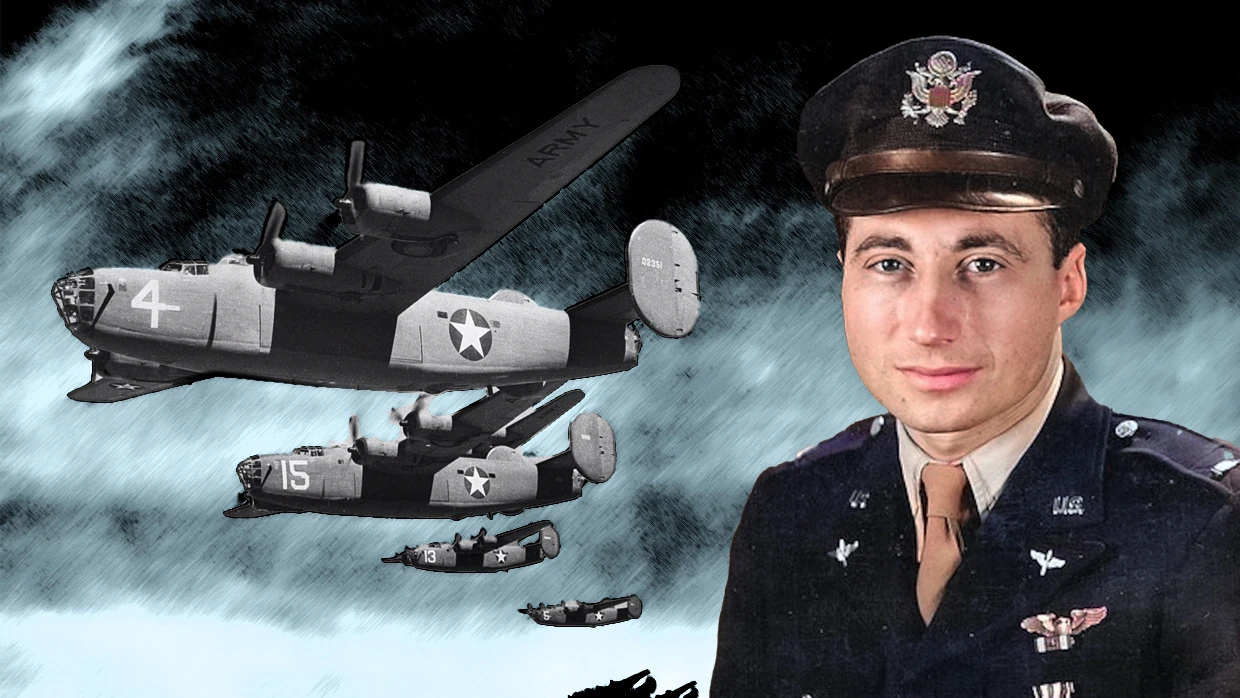

9 min read
The remarkable true story of Robert “Rosie” Rosenthal.
Masters of the Air, Apple TV+’s hit series, depicts the incredible real-life heroism of the 100th Bombardment Group during World War II. Between 1942 and 1945, this American bombing unit, based in England, flew over 300 combat missions. Their work was extremely dangerous: the average pilot survived for just 15 missions; 177 airplanes were listed as missing during combat. The group earned the sobriquet the “Bloody” 100th.
One pilot remarkably flew a record 53 missions and also survived being shot down twice over enemy territory. Introduced in the series’ fourth episode, Lt. Col. Robert “Rosie” Rosenthal was one of the most highly decorated pilots of World War II. As a Jew, he faced even more danger than his fellow pilots: if his Jewish identity were to be discovered by the Nazis, he faced torture and death at their hands. “He was over there to do a job,” Robert Rosenthal’s son Dan Rosenthal has explained. Hyper-focused and dedicated to his mission, Robert Rosenthal overcame his fear and engaged in some of the most pitched battles of the war.
Born in 1917, Robert Rosenthal grew up in a warm Jewish family in Brooklyn. His mother Rosie and his sister entertained the family by singing and playing the piano, and Robert enjoyed singing along with them. He was a popular, athletic boy. Attending Brooklyn College, he was captain of the school’s football and baseball teams. By the end of his college career, Robert was becoming increasingly upset about what was happening to his fellow Jews in Europe. He followed the news of Hitler’s antisemitic and unhinged language, and the many laws that prevented Jews from living normal lives in Germany and other European nations.
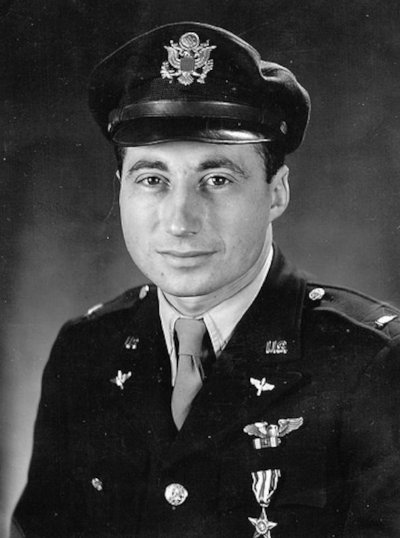
Robert’s father died in 1941, leaving the family in a precarious financial state. By then Robert was studying law at Brooklyn Law School - he would go on to graduate Summa Cum Laude - and began working at a law firm during the day and studying in evenings to make ends meet. Distraught at what was happening to Europe’s Jews, he was itching to make a difference.
On December 8, 1941, the day after Japan attacked Pearl Harbor, Rosenthal enlisted in the US Air Force.
Rosenthal longed to be a bomber pilot and cause maximum damage to the Nazis. He was assigned to a non-combat unit at first and appealed, asking for the chance to fight Nazi Germany and its allies directly. The Air Force acquiesced and Rosenthal trained as a pilot. He found he had a natural talent for flying and loved it. He joined the Air Force as a Lieutenant, and eventually rose his way up to the high rank of Lieutenant Colonel. In 1943, he was transferred to the Eighth Air Force and served in their 100th Bombardment Group. He was one of the oldest pilots in the unit and keenly felt his responsibilities as a fighter and a leader.
Formed in early 1942, the 100th Bombardment Group was composed of 36 B-17 bombers and their crews. They operated as part of the Combined Bomber Offensive (CBO), targeting Nazi forces from their base in Thorpe Abbotts, a massive airfield in the east of England. Pilots in the CBO were expected to fly 25 missions. Flying dangerous sorties over Europe, that target became a nearly unattainable goal.
The National World War II Museum in New Orleans notes that the group “appeared to suffer disproportionately at the hands of the German Luftwaffe, with its members both respected and pitied by fellow bomber crews. Its reputation was well known throughout VIII Bomber Command as a jinxed unit, with the chances of surviving a tour of 25 missions appearing as a dim possibility.” They soon earned the name the “Bloody 100th”. Over the course of the Unit’s service during World War II, 177 airplanes and their crews were lost.
In Masters of the Air, Rosenthal’s character asks a veteran pilot for advice. He replies: “Try to stay alive, for at least 11 missions.” That would “beat the odds” for the unit, Rosenthal is told.
Rosenthal named his B-17 Bombing crew “Rosie’s Riveters.” It was a nod to his last name and also echoed the popular 1943 hit song Rosie the Riveter about a female worker repairing the fuselage of an airplane. As the bomber’s pilot, Rosenthal led the airplane’s substantial crew. “He knew that when he was up (flying), he wasn’t only putting his crew in danger, but others,” his son Dan explained. “He wanted to complete the mission, whatever it was, otherwise they were just putting themselves in harm’s way, and he hated that - he wanted and had a need to be successful. He set a very high standard for his crew, and did it in a way where people would listen and follow. It wasn’t just my father who achieved these missions, it was everyone on the plane and everyone in the squadron, that was his belief.”
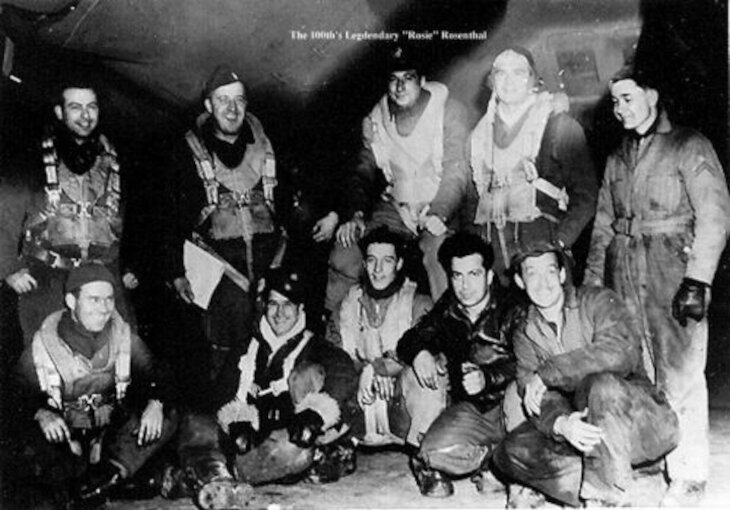 Rosenthal and his crew, March 8, 1944. Rosenthal is standing second from right.
Rosenthal and his crew, March 8, 1944. Rosenthal is standing second from right.
On Rosenthal’s third bombing flight, on October 19, 1943, he was sent as part of a large formation of bombers to attack the German city of Munster. The Bloody 100th supplied three of the bombers. As they flew over Germany, they came under heavy attack. German fighters downed 12 of the Bloody 100th’s 13 planes; only Rosenthal’s aircraft remained in the air and it was grievously damaged. Equipped with two engines on each wing, debris from other airplanes had destroyed an engine on each side.
Alone in the air, Rosenthal tried to fly with another Allied formation from the 95th Bomb Group, but his plane was too damaged to keep up. Instead of turning back, Rosenthal and his crew continued the mission. Within moments, they came under attack from four more German planes. With Rosenthal piloting the damaged airplane, his gunner shot down three of the Nazi aircraft; the fourth flew away. Another wave of German bombers soon descended on Rosenthal and his crew. Rosenthal dove and rolled the plane and miraculously, the Nazi gunners missed. Rosenthal and his crew managed to complete their mission, dropping all their bombs on their designated targets.
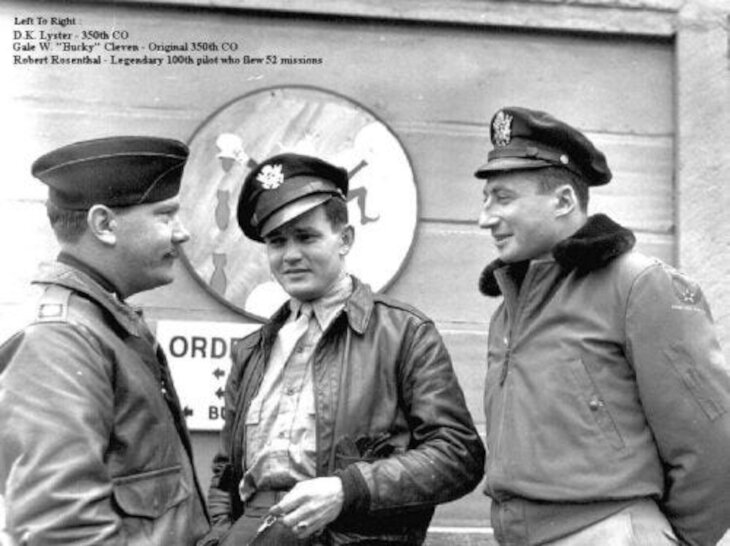
Rosenthal then flew back to England. By the time he was over Allied territory, a third engine on the plane had stopped working and his plane’s right wing had a large hole in it. Just before he landed, the fourth and final engine failed as well. Rosenthal and all his crew were unharmed. As they left the mutilated plane, many of the crew kissed its fuselage. Workers at the air base later found an unexploded enemy shell lodged inside the plane.
In March 1944, Rosenthal and his “Rosie’s Riveters” crew completed their 25th mission, a stupendous feat. Rosie’s Riveters was eligible for transfer out, but Rosenthal reenlisted. “I had to do what I could for as long as I was able,” his son later recalled him saying.
On September 10, 1944, Rosenthal was flying a crew to Nuremberg to bomb targets in that German city. Nazi planes attacked the group over Reims, in France, and shot Rosenthal’s plane out of the air. He and his crew were severely injured; Rosenthal had a broken arm and nose, and lay unconscious in his plane’s wreckage. Fortunately, he and his crew were found by Free French forces and airlifted back to England. Assigned a non-combat role, Rosenthal once again pressed to return to active combat.
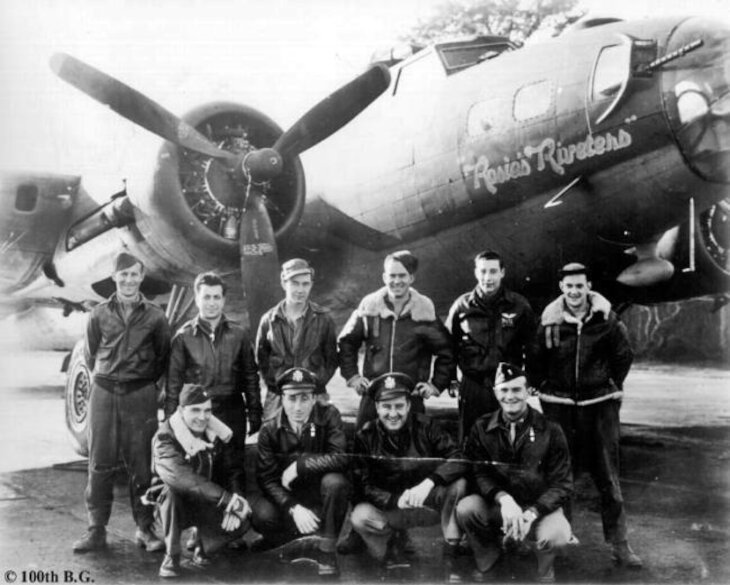 Rosenthal and his crew
Rosenthal and his crew
He was shot down a second time on February 3, 1945. Heading to Berlin to bomb the arms manufacturing plant Erkner, Rosenthal came under attack. With his plane damaged and unflyable, Rosenthal and his crew nevertheless managed to drop their payload on the factory before ejecting from their falling airplane. Rosenthal was the last to bail out, at only 1,000 feet. He and his crew were rescued by Russian forces who helped them return to their base in England.
Rosenthal flew only one more mission: after victory in Europe, on May 8, 1945, he helped evacuate Jews from a concentration camp.
After the conclusion of World War II, Rosenthal returned to his legal practice in New York. He was wracked by the horrors of the Holocaust as details emerged. “Things really began to unravel for him,” his son Dan Rosenthal has described: “For him, justice had not been done yet.”
Rosenthal eagerly applied for a job as an assistant prosecutor to work in the Nuremberg Trials, putting senior Nazis on trial. After fighting Nazis in the air, he now fought them in court, helping achieve convictions of Nazi leaders for their roles in murder and crimes against humanity. From 1945 to 1946, 199 senior Nazis were tried by judges hailing from the United States, Soviet Union, France, and Britain. 161 Nazis were convicted in the trials.
Working on the Nuremberg Trials also led Rosenthal to meet the love of his life, another young Jewish lawyer named Phillis Heller. The two met on the ship they took to attend the trials in Europe. After the conclusion of the trials, Robert and Phillis returned to New York where they raised their family. Robert Rosenthal passed away in 2007 at the age of 89. He was the recipient of 16 wartime medals, and was one of the most highly decorated American pilots of World War II.
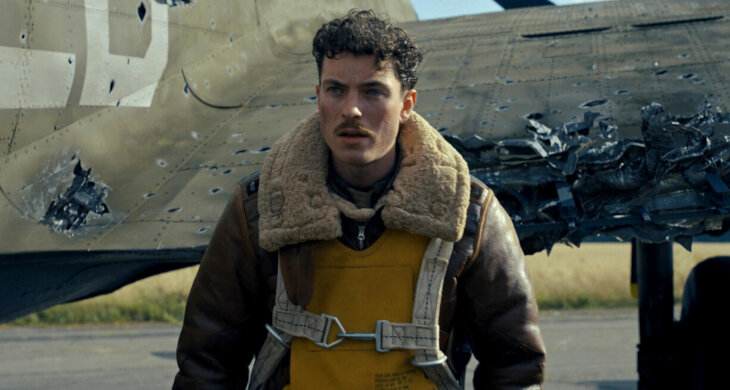 Actor Nate Mann, playing Robert Rosenthal in Masters of the Air
Actor Nate Mann, playing Robert Rosenthal in Masters of the Air
One of his colleagues, Intelligence Officer Marvin Bowman, described Rosenthal as “one of the great figures of the Air Force: a shy, modest, and patriotic gentleman of truly amazing courage and achievement.”
It’s fitting that Masters of the Air is bringing renewed attention to his bravery and heroism and the entire Bloody 100th Unit.
Recommended reading: Masters of the Air: America’s Bomber Boys Who Fought the Air War Against Nazi Germany by Donald L. Miller (Simon and Schuster: 2006).

Interesting that the photo shows B-24’s when the 100th flew B-17’s.
What a courageous man!
Agree, the image of the wrong guy was planes really shows lack of respect for history -- pay attention to detail. Rosie and his fellow airman paid in blood.
I loved this article! I would like to add that “Rosie the Riveter” became the face of the many American women who joined the wartime work force in factories and shipyards, at a time when all able-bodied men were in the military.
And I am fascinated to learn that Lt Col Rosenberg’s wife was a lawyer (unusual in itself in 1945) and that she was on the US legal team for the Nuremberg trials. I never knew that there were women lawyers on the team.
Great Article. My father, also Jewish was a 20 year old bombadier and navigator on a B24 flying out of Italy in 1944-45. His plane was shot down on his 32nd mission over Budapest and he became a prisoner of war. I would humbly offer two corrections. First, there was no "Air Force" at that time the Army' Air Corp eventually became it's own separate arm of the military after the war. Also, German "bombers" wouldn't have attacked our bombers, German fighters would have done that.
I’m a Viet nam combat veteran, bronze star combat winner, but, next to them, I feel so small!
Thank you for your service.
amazing story ! thank you for sharing !
My late uncle, Sumner Woodrow, was a navigator on a bomber that was shot down over Germany. He threw away his dog tags after parachuting out of the plane for fear that the Nazis would discover he was Jewish. He was captured and interned in a POW camp in Rostow, Germany. He was reported MIA to his parents, who feared he was dead.
Not to take anything away from this heroic airman, but the statement that "if his Jewish identity were to be discovered by the Nazis, he faced torture and death at their hands" is simply NOT true. By and large, Nazi Germany DID live up to its responsibilities under the Geneva Convention (up until The Great Escape, anyway), and treated British and American Jews like all other Allied aircrew who were taken prisoner. There is only one documented case of a Jewish airman being at risk of his life as a POW in Nazi Germany, and that was because he was actually a German Jew, who had enlisted and become a pilot in the Royal Air Force using a stolen British identity. He was shot down and captured on September 8, 1941, and I wrote his biography; 'Escape, Evasion and Revenge'.
Thanks for your insightful comment - however it would seem that Nazi Germany did NOT live up to its responsibilities under the Geneva Convention - as is documented by their treatment of Jewish Russian & Polish POWs.
As I wrote, specifically with regards to American and British/Allied aircrew. I deliberately avoided mentioning their horrific treatment of their Russian prisoners. Poles who were flying in RAF units when shot down were treated the same as Brits.
Wonderful. Loved reading this.
Great article. Thanks for telling this story.
My father, Lou Rosenfelt, was a Master of the AIr, flying lead navigator on B-17's near the end of the war in 1945. May his memory be a blessing for us all.
God bless all of these men who flew into great and grave danger knowing that the risk of death was great in battles tens of thousands of feet in the air. Robert Rosenthal was a great leader during and after WWII.
But for their bravery and supreme sacrifice, the Allies would not have broken the back of the Nazi war machine and the Luftwaffe. They did their duty in turning the war in Europe and burying facism and liberating the camps cannot be forgotten.
It was the Greatest Generation forevermore. 🇺🇸🇬🇧 and all other allies.
I read the book on which the tv series was based. to my way of thinking , the book was much more educational and emotional. having said that,more people will see the tv series than will ever read the book. so hurray to the film makers. and my great respect to what the 8th army air force did, along with the british, to bring an end to the war against fascism.